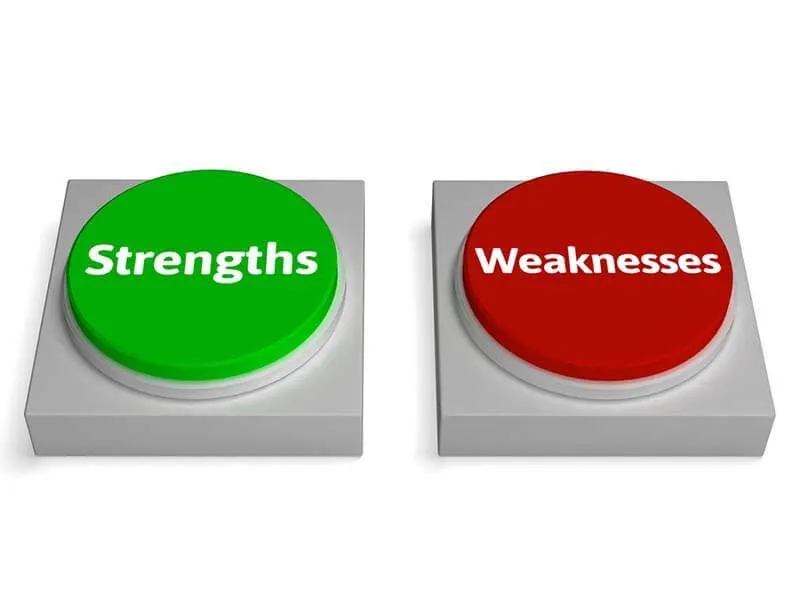If you’re like most people, you probably spend more time focusing on the things that are wrong with your life than you do on all of the great things about it. This is important to recognise because, according to the Pareto principle (also known as the 80/20 work rule), about 80% of the outcome from any situation or system comes from about 20% of the input. So where you are focusing your time, effort and energy makes a significant (most of the) contribution and difference to the end result.
You might think: “I don’t have any strengths.” “I’m not special at all.” But if we really look into it, there is something incredibly valuable that we can learn from this realization — something that could change our lives for the better.
You see, when we focus on our weaknesses, we tend to get discouraged and give up before we even try. We feel like we’ve failed because we haven’t accomplished anything yet.
But when we focus on our strengths, we realize that we already have everything we need to succeed. Our strengths help to achieve success in every area of life.
Why Focus On Your Strengths?
The question of whether you should improve your weaknesses or focus on your core strengths is one that most of us face daily. If you want to find success in life, you’ve probably heard some version of “focus on your personal strengths.” But what are the reasons why should you focus on your strengths, rather than your strength-gaps or weaknesses? Here are some key reasons:
1. It helps you develop confidence
When you focus on your strongest skills and key strengths, you start to believe that you can accomplish whatever you set out to do. This gives you the courage to take action and move forward.
2. It helps you become more positive
If you focus on your natural skills and strengths, including not only your hard skills (like reading and writing) but also your soft skills (like people skills and building project team morale), rather than your weaknesses, you will notice that they make you happy. And happiness makes us more confident and optimistic.
3. It helps you build relationships
When you focus on what you’re good at, you naturally attract other people who share those same qualities.
4. It helps you find fulfillment
When you focus on the things you’re good or bad at, you begin to compare yourself to others. The truth is, no-one else has ever done exactly what you want to do in the way you want to do it. So why should you compare yourself to them? Instead, focus on what you‘re good at so that you can enjoy the journey.
5. It helps you live an authentic life
When you focus on being authentic, you stop trying to please everyone around you. Stop caring so much what people think about you. You simply follow your heart and pursue your passions.
6. It helps you create a better work-life balance
When you focus on building your strengths, you will find ways to incorporate them into your daily routine. This means that you won’t have to sacrifice your personal life for your career.
7. It helps you grow as a person
When you focus on developing your strengths, you will gain new skills and knowledge. You will also experience growth in areas such as patience, perseverance, self-confidence and compassion.
8. It helps you avoid burnout
When you focus on improving your weaknesses, you end up feeling frustrated and overwhelmed. This leads to stress and anxiety which causes burnout. Burnout is a major cause of depression and illness. By focusing on your strengths, you will avoid burnout and stay healthy.
9. It helps you be happier
When you focus on growing your strengths, you will notice that you’re happier overall. Happiness is contagious!
10. It helps you reach your goals faster
When you focus on strengthening your weaknesses, it takes longer to complete tasks. Because you’re not focused on your strengths, you don’t have the energy to keep going. However, if you focus on your strengths you’ll feel energized and excited because you know you can achieve anything.
11. It helps you get ahead
When you focus on becoming stronger, you will see opportunities to advance within your company. As a result, you will earn more money and receive higher raises.
12. It helps you be successful
When you focus on making improvements in your weaknesses, you are constantly comparing yourself to others. When you focus on your strengths instead, you realize that there is no comparison. Everyone is different and unique.
How About Weaknesses?
We’ve all been there. We’re working hard on our weaknesses while neglecting our strengths. Or it may be the other way around for you. Maybe you’re spending too much time perfecting your social media presence. Or maybe you’re trying to get better at public speaking, but find yourself struggling with writing.
Whatever the case, focusing on your weaknesses isn’t necessarily the best way to improve. Here’s why:

1. It makes us feel like we’re failing
If you spend all your time working on your weaknesses, you might start to believe that you aren’t capable of doing something. And when you start believing that you can’t succeed, you actually become less likely to try.
2. It keeps us from enjoying the journey
When you focus on your weaknesses, you miss out on the fun parts along the way. For example, if you want to learn how to write, you may only enjoy the process of learning. But if you focus on your strength, you will appreciate the results.
3. It prevents us from reaching our potential
If you focus on your weaknesses all day long, you may never reach your full potential. The truth is that most people who do great things didn’t focus on their weaknesses. Instead they worked on their strengths.
4. It limits our ability to change
If you focus on your weaknesses for too long, you may begin to believe that those are the only things you’re good at. This means that you won’t even attempt to work on other areas of your life.
5. It creates negative emotions
Negative emotions such as frustration, anger and disappointment are common when you focus on your weaknesses. These feelings lead to stress and anxiety, both of which can make you sick.
6. It keeps us stuck
If you focus on your weaknesses every day, you may feel like you’re getting nowhere. In fact, you could end up accomplishing nothing.
7. It doesn’t help us grow
If you focus on improving your weaknesses, you may feel like your skills are stagnant. If you continue to focus on them, you may even stop growing altogether.
8. It causes us to compare ourselves to others
When you focus on improving your weakness, you may compare yourself to others. For example, if someone else has a skill that you lack, you may think that you should be able to acquire it as well.
9. It leads to failure
Failing is part of life. However, if you fail because you focused on your weaknesses, you’ll probably feel worse about yourself than if you had failed because you weren’t prepared or lacked motivation.
10. It makes us unhappy
When you focus on improving your weak points, you may not feel happy. After all, you’re constantly thinking about what you need to fix.
11. It makes us more susceptible to depression
Depression is one of the leading causes of death in America today. So why would you want to put yourself through that? Focus on your strengths instead!
12. It makes us less productive
When you focus on fixing your weaknesses, you may have trouble concentrating. This means that you’ll be less productive during the times that you do concentrate.
13. It makes us feel bad about ourselves
If you spend all day focusing on your weaknesses, you may start to question whether you’re worth anything.
14. It makes us feel guilty
Guilt is another emotion that comes with focusing on your weaknesses. After all, you know that there are people who’d love to have what you have.
15. It makes us feel helpless
Helplessness is another feeling that often accompanies focusing on your weaknesses. When you don’t see any progress, you may feel like there’s nothing you can do to improve.
Can You Outsource What You’re Not Good At?
If you know what your weakness is, you can figure out how to solve it. But sometimes we don’t know what our weakness is. And even if we do, there are plenty of things we just aren’t very good at. So how do you find someone to help you with those things?
The answer isn’t always hiring another person – especially one who might take over some of your responsibilities. Sometimes you can actually outsource your weakness.
Here are some ways to find someone who can help with your weaknesses:

1. Ask friends for referrals
Your friends will likely know other people who can help you with your weaknesses. They may also know people who specialize in certain areas.
2. Look online
You can search online for local businesses that offer services related to your weaknesses. For example, if you’re looking for an accountant, you could look up “accountants near me.”
3. Search social media sites
You can use social media sites, such as Facebook and LinkedIn, to find people who provide the service you need.
4. Use apps
There are many apps available for smartphones that allow you to connect with people who can help you. For example, the Upwork app allows freelancers to post their work and clients to hire them. You can also use other online marketplaces for freelance services such as the Fiverr app.
Top 6 Benefits of Recognizing Your True Value and Strengths. Here They Are…
The ability to identify one’s strengths and values is critical to success in life and career. In fact, according to Gallup research, “employees who feel they possess strong values and core competencies tend to perform better than those who don’t.” And yet many people struggle with this concept. Why? Because it’s hard to admit that we aren’t great at everything. We want to believe that we can do anything, but the truth is that we often fall short.
In her book, “StrengthsFinder 2.0,” Dr. Barbara Sher shares six benefits to knowing your value and strengths. These include:
1. You gain confidence
2. You become more effective
3. You build relationships
4. You find meaning
5. You make a difference
6. You discover new possibilities.
How to find your values & strengths
Dr. Barbara Sher has developed a process called The VIA Method® (Values Inventory Assessment) to help individuals identify their own personal values and strengths. This method helps you understand yourself by helping you explore your beliefs about yourself, others and the world around you.
The first step in identifying your values and strengths is to complete the Values Inventory Assessment. It takes approximately 30 minutes to complete. Once you’ve completed the assessment, you’ll receive a report that includes your results along with a list of suggested actions to improve your performance.
Once you have identified your values and strengths, you can begin using these tools to guide your decisions and actions.
For example, when making decisions, ask yourself: What would I like to accomplish today? How might my values influence how I choose to act?
When working with others, consider asking questions like: What are the most important things for us to get done today? How might our values affect our interactions?
To learn more about the VIA Method®, visit viacharactercoaching.
Once you can identify your values and strengths, it can help you to:
1. You know where you stand
Knowing your value and strengths can provide clarity around your personal brand. When you know your values, you can better align your professional goals and objectives with your personal aspirations. This allows you to make decisions based on what matters most to you, rather than being swayed by external factors like promotions, salary increases or job offers.
2. Gain insight into your career path
When you know your value and strengths, you can start to develop a strategy for building your career. By identifying your core capabilities, you can determine whether you’d prefer to move up within a particular organization, or whether you’d prefer to explore other options outside of your current employer. This information alone can help you decide whether you’d enjoy working for another firm, or perhaps moving across industries entirely.
3. Improve your performance
If you want to understand how people perceive you, ask yourself: “What am I really good at?” Then try asking people about your weaknesses. You may be surprised by what you discover.
Research suggests that focusing on your strengths can not only help to improve performance, but can also help to boost your self-esteem and productivity.
Set Professional Goals for Yourself
A lot of people think about setting goals at the beginning of each year. But it doesn’t always happen the way we intend. And even if you do set goals, most of us don’t follow up on them. Setting goals isn’t enough; you need to make sure they’re realistic and measurable. If you want to know how well you’re doing, ask yourself these questions: What are my strengths? How am I performing compared to others in my industry? When did I last review my goals?
If you’ve been thinking about setting goals, now is the time to start making some plans. You’ll find plenty of resources online to help you come up with ideas. For example, here are some tips from LinkedIn’s career development team:
1. Identify your strengths
Think about skills that you possess and apply those to specific areas within your job description.
2. Create SMART goals
A goal is defined as “SMART” if it includes:
Specific – Be clear about exactly what you want.
Measurable – Make sure your goals are clearly stated and easily measured.
Attainable – Your goals must be realistic and achievable.
Relevant – Goals must align with your overall career objectives.
Timely – Don’t wait too long to set and measure your goals.
3. Review your goals regularly
Check in every month or quarter to see whether your goals remain relevant. If they aren’t, re-evaluate your priorities and adjust accordingly.
4. Evaluate your performance
To determine whether you’ve met your goals, take stock of your accomplishments and compare them to your previous performance. Then, discuss your successes with your supervisor and peers. This will give you insight into where improvements can be made.
5. Adjust your approach
If you feel like you’re falling short, try to identify why. Is there something you could be doing differently? Are you working harder than expected? Or maybe you should change your strategy altogether. Whatever the case, remember that small changes can lead to big rewards.
6. Set new goals
Once you’ve identified your strengths, you may have realized that you need to work on certain aspects of your job. In this case, you need to set new goals. The key is to keep your goals realistic and attainable.
7. Reward yourself
Finally, it’s important to reward yourself when you meet your goals. Take a day off, go out for lunch.
Strategies for Leveraging Your Strengths
Your strengths come from your innate abilities, like being good at math or having a knack for languages. But learning new things helps you grow as well. And it doesn’t take much — just 10 minutes a day.
Here are some ways you can use your strengths to make yourself more effective every day:
1. Find out what you’re really good at
Use your strengths to help solve problems. Ask yourself, “What am I naturally good at?” For example, maybe you’re great at making friends because you’re friendly and outgoing. Or maybe you’re good at understanding people because you listen carefully. Look into how you might apply these talents to your work. You could ask colleagues about their experiences working with you.
2. Practice your strengths
Spend 10 minutes each day practicing something you do well. This could mean writing down a list of your best qualities, taking a self-assessment quiz to see where you excel, or reading books related to your interests.
3. Make room for growth
Every day, you’ll learn something new. Don’t try to fit too much into one day. Instead, set aside a few hours each week to focus on improving your weaknesses.
4. Keep track of your progress
Write down your successes and failures in your notebook or journal. Then look over your notes periodically to keep yourself motivated.
5. Remember, practice makes perfect
If you want to become better at anything, spend time doing it. Over time, you’ll develop natural instincts that will improve your performance.
6. Be open to feedback
Ask others for advice on how you can improve your skills. They may not know exactly what you’re looking for, but they can offer suggestions.
To Re-evaluate Your Perspective On Yourself, Use the SWOT Analysis
Instead of focusing too heavily on judging yourself, focus instead on objectively evaluating your life’s experiences and lessons learned. A SWOT analysis is a good tool for helping you re-evaluate yourself and your strengths, weaknesses, opportunities and threats.
S – Strengths. List the things you’re good at. Which jobs do you find most rewarding? And which courses did you study? If you’re unsure about something, consider whether other people often ask you for help.
W – Weaknesses. What kinds of tasks do you dislike doing? Do you ever procrastinate? Be aware of any weaknesses in your current skillset.
O – Opportunities. What specific things can you do to help yourself get better at growing? Are you able to get professional help? What can you learn from courses or classes that can teach you things to help you become better at something?
T – Threats. You may be tempted to give up if you feel insecure, physically unhealthy, mentally unwell or financially challenged.
To be successful, we must first understand where we are at now. A personal SWOT (Strengths, Weaknesses, Opportunities, Threats) assessment can help us do that.
By identifying strengths, weakness, opportunities, and threats, we can use this knowledge to improve ourselves and focus on our strengths while minimizing our weaknesses.

Frequently Asked Questions
What does focusing on your strengths actually mean?
It means to identify your natural or unique abilities and then to use them. It also means to take advantage of all the resources available to you.
There are many ways to identify your strengths. One way is to think about your own experiences. Think about the things you enjoy doing / are good at as opposed to the things you find boring or challenging.
You might already know some of your strengths. For example, you might be naturally curious, creative, patient, organized or persistent.
But even if you don’t know your strengths yet, there are still lots of ways to figure out what you’re good at:
1. Ask friends and family members who have known you for a long time.
2. Look through old school papers, college applications, resumes, etc.
3. Read books of interest, eg. about leadership, management, sales, marketing, etc.
4. Take online tests like the Myers Briggs Type Indicator.
How are you applying your strengths at work?
The best place to apply your strengths is in your daily activities. When you’re working with clients, customers, colleagues, etc., try to make sure you’re using your strengths.
For example, when you’re talking to someone, you might focus on listening more than you talk. When you’re writing an email, you might write concisely. When you’re meeting with a client, you show interest in their needs.
When you’re trying to solve problems, you look for solutions that involve creativity.
When you’re asking for feedback, you ask questions that demonstrate your curiosity.
If you notice that you’re not getting results from your strengths, it could be because you aren’t making full use of your strengths.
One way to check is by looking at how you spend your time. How much time do you spend doing enjoyable activities? How much time is spent doing stuff you don’t really want to do?
Another way to check is by thinking about the different roles you play in life. Is one role more important than another? Does one role require more effort than others?
What are good examples of strengths?
Here are some examples of strengths:
• Curiosity
• Creativity
• Persistence
• Patience
• Optimism
• Empathy
• Self-awareness
• Leadership
• Teamwork
• Good listening skills
• Problem solving
• Initiative
• Flexibility
• Communication
• Organizational skills
• Confidence
• Humility
• Trustworthiness.
What are 5 characteristics of a good employee?
A good employee has these qualities:
• They are self-aware.
• They are honest.
• They are committed.
• They are respectful.
• They are responsible.
How do you answer a strength-based question?
Answer a question based on your strengths by describing something you’ve done recently that demonstrates your strengths.
For example, “I’m really good when explaining complicated topics.” Then give an example of how you demonstrated that skill.
What are 3 examples of weaknesses you can use in an interview?
Weaknesses are often questioned in interviews to see how well candidates will fit into a company culture. Some companies want employees who are hard workers, while other companies want employees who are flexible. Some companies want employees who are detail-oriented, while other companies want people who are able to multi-task.
Here are 3 examples of weaknesses:
• I’m not very organized.
• I get distracted easily.
• I tend to procrastinate.
Once you’ve identified a weakness you should demonstrate how you are actively working on, or overcoming, that weakness. For example, you might say that you’re not very good at public speaking, however, you are currently doing Toastmasters to help you improve your speaking skills and give you more confidence when speaking in front of an audience.





